|
FAQs on Betta
Diseases/Health 34
Related Articles:
Anabantoids/Gouramis &
Relatives, Betta
splendens/Siamese Fighting Fish,
Betta Systems,
Betta Diseases,
Improved
(Better?) Products for Bettas!,
Related FAQs:
Betta Disease 1,
Betta Disease 2,
Betta Disease 3,
Betta Disease 4,
Betta Disease 5,
Betta Disease 6,
Betta Disease 7,
Betta Disease 8,
Betta Disease 9 ,
Betta Disease 10 ,
Betta Disease 11 ,
Betta Disease 12 ,
Betta Disease 13 ,
Betta Disease 14 ,
Betta Disease 15 ,
Betta Disease 16 ,
Betta Disease 17 ,
Betta Disease 18,
Betta Disease 19,
Betta Disease 20,
Betta Disease 21,
Betta Health 22,
Betta Health 23,
Betta Health 24,
Betta Health 25,
Betta Health 26, Betta Health 27,
Betta Health 28,
Betta Health 29,
Betta Health 30,
Betta Health 31,
Betta Health 32,
Betta
Health 33, Betta Health 35,
Betta Disease
Causes/Etiologies: Determining/Diagnosing,
Environmental (By far the largest cat.),
Nutritional,
Viral/Cancer,
Infectious (Bacterial, Fungal) ,
Parasitic:
Ich/White Spot,
Velvet;
Senescence/Old Age,
Cures/Curatives/Treatments,
FAQs on Betta Medicines:
Betta
Medicines period, Antibiotics/Antibacterials,
Anti-Protozoals (Metronidazole,
eSHa...), Copper,
Formalin,
Malachite Green,
Anthelminthics,
Organophosphates,
Salts,
All
Other Betta Med.s,
|
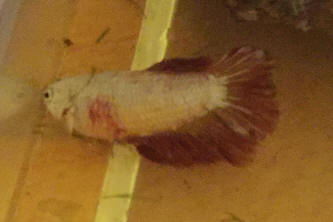
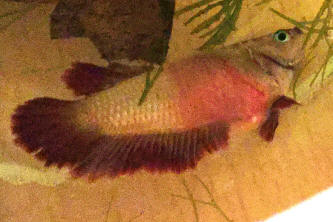
|
 |
Betta Success
Doing what it takes to keep Bettas healthy long-term
by Robert (Bob) Fenner
|
|
My Betta Fish Hector 8/16/17
To Whom it may concern,
<Howsit Deb?>
I am concerned about my Betta fish. I got him last week like this and he is
eating and behaving normally. I know for a fact that he has a mild case of fin
rot though, but what I cannot figure out is whether the slight discoloration
(brown spot) in his face is normal or a fungal infection.
<Mmm; may be "just" stress. Perhaps simply from being moved. Do you have
measures for water quality? This system is cycled, filtered, heated?>
Please help, this is my second Betta Fish and I am doing everything I can to
understand the situation.
I appreciate it.
Sincerely,
Deb
<Need information. Bob Fenner>
|
 |
|
Re: My Betta Fish Hector 8/16/17
Dear Bob,
<Hey Deb!>
The tank is heated and filtered and I used bottled water for when I first got
him a week and a half ago.
<Mmm; what sort/s of bottled water? Is your tap/mains water real trouble?
Bettas do need some mineral, hardness... I would at least mix some (a quarter,
half?) of such bottled water with tap>
He seems to be fine since he eats (I feed him two fish pellets a day) and also
builds frequent bubble nests.
<Ahh! Good signs>
He's usually very active. I added aquarium salt in his tank about 5 days ago.
Sincerely,
Deb
<I would leave all as is then... Again, being moved is likely the cause of the
split dorsal fin, concern re facial color loss here. Treatment/s will likely
cause more harm than good. BobF>
Re: My Betta Fish Hector 8/17/17
Bob,
<Deb>
Thank you so much for your help!
- Deb
<Certainly welcome. I'd ask that you read (re-read?) this brief piece on Betta
Care:
http://www.wetwebmedia.com/fwsubwebindex/betta_splendens.htm
to set my mind at ease that I've mentioned all the basics here. Bob Fenner>
|
|
Betta distress; trauma 7/11/17
Hello there!
<Howdy!>
My name is Saffron and I have an established community sorority tank.
It's 29 gallons with 6 girls, 9 diamond tetra, 2 Otos and 5 bronze
cories.
*Here is my issue*:
A few weeks ago now, one of my girls got sucked into the canister filter
through my surface skimmer on my lily intake pipe which had fallen below
the water line. I happened to be in the right place at the right time.
I quickly unplugged the filter, released the quick release and out she
plopped. I immediately put her in a plastic container with an inch or so
of water so she didn't have to support herself by swimming. She was
obviously dazed and pale. I diluted some aquarium salt, added another
inch of water and added some Seachem stress coat and left her floating
in the tank over night.
<Good>
When I released her into the tank she had coloured up a bit, but was not
her full vivid red (she is a koi). Lately she has been keeping to her
corner and swimming alright, and while she still never coloured up she
has been doing better.
Now when I got home yesterday from a weekend trip, I noticed she was
pineconing slightly and keeping to herself more than usual. So I
immediately took her out and gave her an aquarium salt bath and added
some
stress coat. I kept her there for about 5 minutes and added her back
into the tank. This morning she was resting in the bottom of the tank,
and when I get home tonight I will be quarantining her in a 4 gallon
tank. She is not as pale as she was when she first got sucked in, but
more pale and slightly bloated, although she did come up for food.
I also noticed one of my cory's had a white spot on his fin, and
preemptively dosed the tank with API fungus cure, as I do have Nerites
and a mystery snail that I would like to keep around.
I will try and get pictures later, but the Cory is quite shy and runs
every time I move near the tank, but my biggest concern is my little
girl.
<I would not be concerned w/ "one spot" on a Corydoras... likely this is
nothing... perhaps a minor wound site>
Is there anything you can recommend for me to try for Vivian? I'm just
trying to be a good fish parent, and I'm at somewhat of a loss for what
to do besides start dosing with medication, which isn't always the
answer because it will suppress the rest of my fish as well.
<Understood; and at this point, given what you state, I would NOT treat
the tank, life there... but just endeavor to keep good, stable
conditions. Likely this fish will heal on its own>
*Here is the background:*
It's a heavily planted tank and I have just started experiencing some
black beard algae which I have been addressing by minimizing the light
exposure and dosing directly with excel. I have a co2 system ready to
go, but given my last couple of weeks I have been holding off on setting
it up because I don't want to imbalance the tank too much, or risk a
crash.
I have been battling a bacterial bloom in the tank from my auto-feeder
dumping too much food while I was away (which is my fault but I had
little choice as I go away weekly during the summer). Which has led to a
Ramshorn
explosion. I have since changed vacation food types when I'm away to
small slow sinking pellets and will be getting a feeding circle. When I
am home during the week, I have been doing 30% water changes every other
day or so to manually manage the system in the tank.
Sorry for the novel and thank you for taking the time to read.
Cheers,
Saffron
<Steady on here; and please do send us a follow up with your further
observations. Bob Fenner>
Re: Betta distress 7/12/17
Hi Bob,
<Saffron>
thank you for taking the time to read my mini novel. I had dedicated
well over two months to planning and setting up the hardscape for my koi
Betta sorority, with a few disasters in between, so I suppose this is
just one more lesson for me to tuck into my book of learning.
<Good attitude>
I really appreciate the amount of time that you have dedicated to
creating such a vast resource on the internet for like minded folks. I
have been keeping a blog/journal so to speak, for other newbies (I only
started serious fishkeeping in February) and documenting all of my
resources. So thank you again!
<Thank you for your efforts>
I have attached a couple of pictures of Vivian in her 4 gallon
quarantine tank and the 29 gallon tank during the bacterial bloom.
<Nada attached; oh, I see below linked>
Her injury first happened on June 3, so it took a little over a month
for her symptoms to get worse. I also believe that the worsening was
directly related to the small bloom that has been happening in my tank,
which I finally have under control. It has taken about 3 weeks with 2-3
water changes a week of about 10-30% for the bloom to completely subside
from one weekend of accidental overfeeding. In the picture there is
white sand, and you can see the slight fuzz over the sand. Her little
bit of claimed territory is the top left corner of the tank
(incidentally why she got sucked into the intake in the first place).
I gave her a short Epsom salt bath last night and one of her eyes has
reduced in size, and her pineconing (which was slight) has also reduced.
So now she just has one swollen eye, and she floats tail up
intermittently, but she is swimming and eating. When I get home tonight
I will check in again. I too am not too worried about the Cory. He
doesn't seem to be inhibited at all, and is just as skittish as ever.
<Good behaviors>
I tend to scour the internet before I ask for help because I know that I
am not the first person who has run into problems, but the reassurance
that you are offering just by taking the time to read this is very
helpful.
Thank you :)
I hope you're having an awesome Tuesday.
Saffron
<And you. BobF>
|
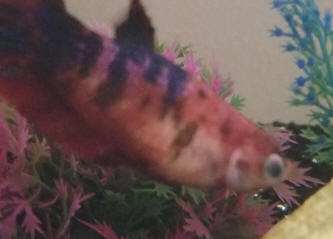
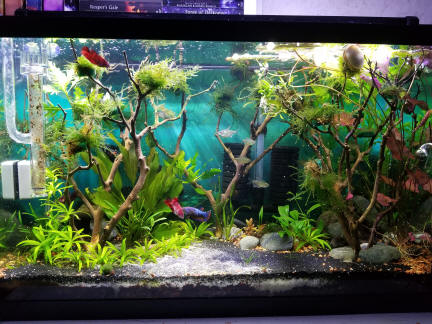 |
|
What is the treatment for this Betta? (RMF, chip in if you want!)
6/21/17
Hi, I was hoping you could help my fish?
<Certainly seems to have been through the wars!>
I will copy and paste what I wrote on a forum. So far they haven’t been much
help… was hoping you might!!
"Yes, you may have seen my other thread. *To catch you up quick-* At this point
I just need some expert eyes to take a look at him and tell me what you believe
it is and what my next plan of action. The fresh water in his hospital tank and
10 days of hard salting has absolutely helped, particularly in the reducing of
the black in his fins and behavior. He ate this morning and took a bite of a
bloodworm tonight. More progress than in weeks. He is not old.. estimate 1yr
4mos. I let it get so far because I wasn't aware of the dangers of lumps on
fish. This started I believe in January.. maybe before. He had come from very
active in his 10gal with my Pleco (little Pleco). I took him from Petco in OCT
to be a companion and because he was the suicidal looking one at the time! :( He
had some great times for awhile. Tank was vacuumed cleaned 1/3 a week and then
time started to get away from me and it changed to 50% every 2 weeks and then 3
at the end.
<Was this alongside filtration? To be clear: Bettas need filters. Maybe small,
gentle, air-powered sponge filters rather than electric canisters -- but
filtration nonetheless! Exposure to non-zero ammonia and nitrite will cause
stress, sickness and death.>
I won't allow that again!! Anyway this fish was very lively, spent most of his
time swimming and socializing, then more of his time chasing his reflection,
then most of his time at the heater. I had a hard time keeping tank warm so much
of the winter it was 75ish. I assumed for heat, but maybe was feeling lousy.
<Bettas do need steady heat. Around 25 C/77 F is good, even a smidgen above; but
consistently cooler or unstable temperatures are bad. Cold air is especially
stressful for them, hence the need to provide a lid over the aquarium to keep in
the warmth.>
This whole thing came on very very slowly. Right now I have him on Kordon fungus
rid and 1tsp per 5 gal Salt., just so it's something fighting till I know what
to buy next. (and double dose stress coat)
Questions!
1. Does this look like a case of fungus and fin rot?
<A bacterial infection (such as Finrot) seems much more likely than a fungal
infection. There are medications that treat both, such as eSHa 2000 and
Kanaplex. Avoid the tea-tree oil products (such as Melafix and Bettafix) as
these are rather unreliable -- anything marketed as having "the healing power
of..." is likely about as useful as healing crystals!>
2. Since I ran over my treatment of salt, where do I go next? Next meds?
<See above; salt isn't a treatment for anything you're dealing with here.
Indeed, it might well stress your fish.>
3. How often do I clean tank and what %?
<Assuming mature biological filtration, weekly water changes around 25% are
ample. Betta breeders who don't use filters but instead keep Bettas in jars have
to do 100% water changes every day, ensuring temperature and water chemistry
remain constant -- this just isn't practical for casual fishkeepers.>
4. As a side question, if I harvest him Mosquito Larvae and clean them, will
that help him? He LOVES them.
<Like potato chips, mosquito larvae are a perfectly acceptable snack. But they
aren't particularly nutritious, and there's some suspicion that they can bring
diseases into the aquarium, so don't use them every day. Much better to focus on
good quality flake and pellets (Tetra, Hikari and other leading brands are all
good) alongside safe live foods with no risk of carrying disease (brine shrimp,
daphnia and wingless fruit flies are reared in fish-free environments, so should
be safe).>
Current behavior: Swims around, hangs on top mostly, just started attempting to
eat, scared easily. Will extend fins, but not in full flare. Lethargy. “
Thank you!!!
<Welcome. Neale.>
|
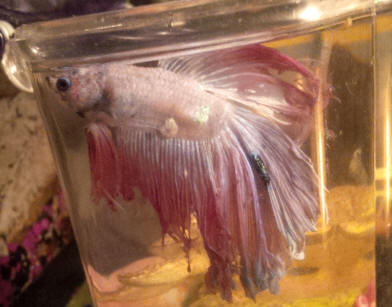 |
|
Re: What is the treatment for this Betta? (RMF, chip
in if you want!) 6/24/17
I guess what Ill do is ill make my writing blue so its not so confusing
<Eh?>
Yes, he’s a fighter!
<Indeed.>
Yes, he lived in a filtered and buffered 10 Gal with my Pleco
<Ah, the plot thinnens. Common Plecs, and possibly even Ancistrus
(Bristlenose) Plecs too, will "latch" onto the flanks of slow-moving fish to
graze on the mucous there. It may be that they're hungry, Plecs often being
given far too little food -- in the wild they're constantly ploughing through
algae and organic muck, processing massive amounts of food. Anyway, Plecs cause
horrible scars and blisters on the fish they 'attack', and because they do so at
night, many people find it hard to believe their Plec is responsible. But if you
see big blisters on the side of a fish, a hungry Plec is very likely the cause.
Seen this many, many times. If in doubt, remove the Plec to another tank (10
gallons is too small, even for an Ancistrus) and medicate as per Finrot; you
should see the Betta healing up nicely.>
Haha, it works the same with people!! Bactria and fungus aren’t to be messed
with… you want them dead! Ok, here’s the thing, you suggested Kanaplex and two
people on the forum suggested Metroplex by the same company. I told them what
you suggested and they said Kanaplex for secondary infection. I emailed Seachem
which one they’d steer me (hoping they get back to me!) But now I’m really
confused because when I looked at their products I found Paraguard which
supposedly covers everything. Now I’m really stuck!!
<Paraguard is more of a "first response" before fish get really infected wounds;
for example, after they've had a fight and their tail fins are a bit torn.
Kanaplex and MetroPlex are both good, but have different jobs. MetroPlex is
primarily used when dealing with protozoan pathogens such as Whitespot and
Hexamita, this latter extremely difficult to treat without using Metronidazole.
Kanaplex is an antibiotic containing Kanamycin, and a better bet when treating
Finrot and other bacterial infections. Make sense?>
Thank you!!!
<Most welcome. Neale.>
Re: What is the treatment for this Betta? (RMF, chip in if you want!)
6/24/17
<Ah, the plot thinnens. Common Plecs, and possibly even Ancistrus (Bristlenose)
Plecs too, will "latch" onto the flanks of slow-moving fish to graze on the
mucous there. It may be that they're hungry, Plecs often being given far too
little food -- in the wild they're constantly ploughing through algae and
organic muck, processing massive amounts of food. Anyway, Plecs cause horrible
scars and blisters on the fish they 'attack', and because they do so at night,
many people find it hard to believe their Plec is responsible. But if you see
big blisters on the side of a fish, a hungry Plec is very likely the cause. Seen
this many, many times. If in doubt, remove the Plec to another tank (10 gallons
is too small, even for an Ancistrus) and medicate as per Finrot; you should see
the Betta healing up nicely.>
OH MY GOSH, thank you!! Now that makes sense!!! I had no idea!! They used to
hang out together but I know the Pleco is VERY active at night. He throws stuff
around in the tank.. sounds like an elephant. That and too the Betta would flare
at his reflection and I know that makes them prone to fin rot in the long run!
<Paraguard is more of a "first response" before fish get really infected wounds;
for example, after they've had a fight and their tail fins are a bit torn.
Kanaplex and MetroPlex are both good, but have different jobs. MetroPlex is
primarily used when dealing with protozoan pathogens such as Whitespot and
Hexamita, this latter extremely difficult to treat without using Metronidazole.
Kanaplex is an antibiotic containing Kanamycin, and a better bet when treating
Finrot and other bacterial infections. Make sense?>
Yes, yes it does!! Thank you again!! I will order it ASAP. Finally something
makes sense :) I will update you if you don’t mind :)
<<By all means, and glad to help. Cheers, Neale.>>
Re: What is the treatment for this Betta? (RMF, chip in if you want!)
6/28/17
Hey, it's me again!! My Kanaplex just arrived *Yay*. Do you have any idea how
the HECK I dose it?
<Accurate kitchen scales, perhaps? Weigh out the amount needed for, say, 5
gallons; divide by 5, and that's how much to add to 1 gallon.>
I measured their small scoop dose (it's per 5 gallons) and 3 of those fit into
1/4tsp measuring key. How on earth do I dose that for a half gallon tank!!???
<I would NOT be keeping a Betta in a 0.5 gallon tank. As a friend of mine used
to say, "that's not an aquarium, that's a vase"! My first investment would be
something bigger, 4-5 gallons, knowing that improved living conditions WILL
improve the chances of your fish doing well/getting better.>
Also - I have a giant plastic Poland spring bottle that is 5 gal that I use to
clean tank with.. could I pre put the meds in there and then give him 100%
changes everyday? will it stay good.
<Tricky to say. Diluted medicine should be fine for a day or two, but that
assumes no further chemical reactions. Sunlight, dissolved gases, even the
minerals in drinking water are all possible sources of problems -- not to
mention any bacteria able to grow in the diluted medicine that couldn't survive
(or even get into) the sealed, concentrated medicine bottle. So without a vet
telling me this was safe, I would not do this.>
Or is it a medicine that builds up in the tank and needs to be kept as is and
not cleaned?
<Generally fish medicines break down in the aquarium very quickly, likely within
a day or so, simply because it's a warm, oxygen-rich environment with lots of
organic detritus. Hence we need to add medicine every day (or
whatever) across a period of several days.>
Thanks!! *head tree*
<Head tree? Cheers, Neale.>
Re: What is the treatment for this Betta? (RMF, chip in if you want!)
6/28/17
Haha, I got a response from Seachem as well.
<Cool.>
Thank you.
<Welcome.>
Yeah, they said do 1/5 scoop or pre mix all in 5 gal and take what I need from
it. That sounds the easiest. Of course!! I'm not keeping fishy in this box!!
He's just in there to heal and break from the filter (buffered or not, there's
still movement) .. it's working great.. he keeps on eating' :) So far so good on
Kanaplex. You shouldn't hear from me for another week or so. lol!
<Let's hope, eh?>
Hey, and yes, when you get home late, excited to see fish meds in the mail and
open the box to find complicated measurements banging your head against a tree
comes to mind.
<Indeed. Good luck, Neale.>
|
|
Identification of possible parasite
5/19/17
<Karan... we ask that folks send image files of a few hundred Kbytes; yours
is some 17 megs... >
Hi there
I have a very poorly Betta who has been battling a number of issues for a
few months. He has PopEye in one eye which has not responded to any
treatment - daily water changes, Indian almond leaves, Epsom salt baths,
Myxazin, meth blue baths (all treatments spaced out over a few months).
<Unilateral exophthalmia can be the "Dickens" to cure, depending on root
cause, how entrenched it has become>
He has lost a lot of colour and energy but still eating and I have
now spotted something attached to his side which I think is a
parasite but I'm not sure. Would you be able to help identify if it is a
parasite and what
type it is and what treatment you would advise?
<Yes; I see what appears to be an "Anchorworm" (actually a crustacean
parasite) on the "chest area"; please see here re:
http://www.wetwebmedia.com/fwsubwebindex/anchorwrmfaqs.htm
He is in a filtered 12L hospital tank (half filled as not swimming to bottom
great - swim bladder?) temp 82 with ammonia and nitrite 0 and nitrate 40
(tap water 40 too at the moment) I use Prime to condition water.
Cheers!
Karan
<Please write back if your course of action is not clear here (after
reading); I would carefully tweeze this adult Lernaeid off, dab the wound
site w/ a proscribed topical antiseptic... and treat the system per the
above reading to eliminate unattached stages. Bob Fenner>
|
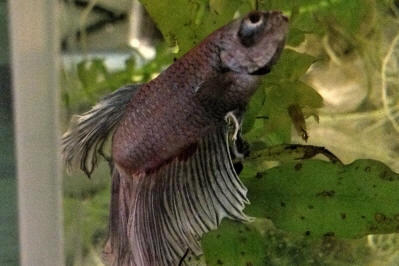
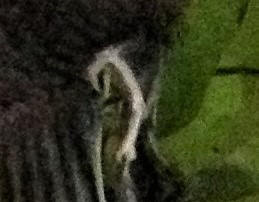 |
|
Re: Identification of possible parasite
5/20/17
Thanks Bob. Apologies for size of pics! I attempted to remove the parasite but
it didn't go well and the head is still buried.
<Ahh!>
I now have one very stressed out fish and half an anchor worm!
<Well; a bit more chance for secondary infection... but the rest will decompose
in time>
I'll get some Waterlife Parazin and treat with that. Hoping that will sort the
worm and improve his overall health if he survives tonight.
Thank you :)
<Steady on Karan. Cheers, BobF>
|
|
Betta Fish Help 4/21/17
Good Evening,
<Toni>
I need help identifying what is wrong with my fish. He's about 2 years old,
an his "breed" is called an elephant ear Betta. Tonight as I went to feed
him, I noticed he was swimming weird and his right fin was barely moving,
then I saw it... this growth coming from it, there's also a small
one near his tail.
<I see these... granulomatous tumors>
Please see attached pictures and let me know if it's something that is
serious or can be fixed with drops in his water. Currently he's in a 2
gallon heated tank. There is no other discoloration on him, the only weird
looking things are the growths, sorry if the lighting isn't great!
<... Please read here:
http://www.wetwebmedia.com/fwsubwebindex/BetDisViralF.htm
IF this is what it appears, only improved nutrition and environment can/will
extend this fish's life. Bob Fenner>
|
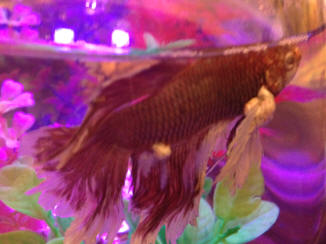
Re: Betta Fish Help
Thank you.
<Welcome>
|
|
Betta has bloated belly..
4/1/17
He's in healthy, cycled tank.. Bloating began two months ago with lump on side,
now belly is swollen too. Alone in ten gallon. Almost two years old.
Weekly 50% water changes. Treated with antibiotics in water column for 10 days,
then mixed with food for five. That was a month ago with no
improvement. Eating heartily still.. But much less active.. Some trouble
swimming too.. Upright. But struggles with turns because of swollen tummy..
Only thing I hadn't tried was treating for parasites. Tried PraziPro 5 days
ago.. Seems this "might" have reduced swelling a bit.. More PraziPro?
Different method of treating for internal parasites? Don't like treating without
knowing for sure, but no access to bio lab, and poor thing slowly going downhill
either way.. Advice?
<Reads like a (virally mediated) tumor. Please read here re:
http://www.wetwebmedia.com/fwsubwebindex/BetDisViralF.htm
No real treatments known. Bob Fenner>
Betta has bloated belly: Continued
4/2/17
Thank you, but so sad to read your advice this morning that the lump and
subsequent swelling in the poor guys belly is likely caused by a "*viral
mediated tumor*," and therefore un-treatable.
<Well, one can only hope; and I really hate to give up... but neither am
I liable to candy coat a situation. You COULD try the Epsom Salt,
Iodide-ate et al. treatments gone over where I referred you... But the
likelihood of
positive results is not good>
He's such a fighter. Was really hoping my final effort to treat for
internal parasites might possibly help, though I "haven't" had much
confidence in the possible effectiveness of such treatment given his
condition. This now leads me back to focusing on my sadness and concern
that he may be suffering terribly.
Someone gave me the advice that since he's eating it's a good sign, and
specifically states, "he won't eat if he's in pain." That advice was
comforting, but is she correct?
<Not in my long experience w/ Bettas... they will literally take food
till they're dead>
His quality of life is "definitely" reduced. Difficulty swimming. Mostly
just sits on his Betta leaf. No bubble nest for over a month. Only swims
off leaf to come over and eat, then right back to leaf.. Swims back and
forth from leaf to floating plants several times a day, and even though
he's a lone Betta, in his own ten gallon, he rarely explores anymore.
Mainly just stays in 8 inch radius at top left corner of tank. Once
every couple days he'll actually venture to his big castle he used to
love and hide in its caves. But that's it. :( Are you familiar with any
studies that have concluded, one way or the other, how fish feel and
think?
<Yes; have read quite a bit re>
Their capacity for such things? So far the opinions on this topic vary
widely. Often diametrically opposed. One group believes they are truly
aware and very sensitive creatures (where I'm feeling I fit in,) or the
other camp emphatically promotes the belief that they feel and think
practically "nothing," therefore "no need to stress over that hook in
their mouth fishermen, enjoy your hobby!" Haven't seen much middle
ground.
So I ask; what is "your" belief? I'm asking because this poor guy is
hanging on for so long. Over two months since lump appeared, and about
"one" month now that he's been struggling with the additional swelling
in his belly and decreased activity/lethargy. Is he suffering? How much
is "too" much?
<Hard to gauge>
and how long might he actually continue in "this" condition?
<Months more>
Because if he's "not" suffering, maybe this isn't so bad unless his
condition worsens. And in conclusion, I've read quite a bit on the sad
topic of euthanizing fish :( With the belief, that if necessary, I
desperately want to know how I can help end his suffering, though I'm
honestly not sure I could do it myself, nor trust anyone else to, but I
somehow "need" to summon that courage and strength if it goes that
direction. I bought Eugenol @ local drug store. Red Cross Brand was the
closest I could find to what I believe to be the right product. 85%
Eugenol
15% sesame oil. Is this okay?
<Yes; a favored material here>
couldn't find 100% Eugenol. And further, I've just read, that because
Bettas are strong, "and" because they are able to breath some air as
labyrinth fish, they can sometimes struggle desperately, and visibly
appear to suffer horribly from the process :( Fear of this compels me to
ask if MS-222 (Tricaine methanesulfonate) would be the best
way to go?
<Mmm; not necessary, recommended... and difficult for the general public
to acquire>
From my research it appears MS-222 is a "true" anesthetic; not some
improvised substance used to reduce "toothache" pain :( Though I feel
for "everyone" who loves their pets and are doing the best they can to
end
such suffering, and I feel this clove oil is likely one of the most
humane methods I have learned of, I think I may have found the "truly"
best way to carry out this sad responsibility if it becomes necessary.
Please share your thoughts regarding, (1) How long might he last in
present condition."
(2) What are "your" beliefs regarding how aware fish are and what they
think and feel? (3) How much is "too" much? and (4) "Should" I order the
MS-222 to be best prepared for if that time comes, and put that clove
oil
in the medicine cabinet to use for any future toothache pain, since that
is the purpose it is produced, marketed, and distributed for?
Thank you in advance.
Sincerely,
Betta Friend
<I would have you read Neale's piece re here:
http://www.wetwebmedia.com/euthanasia.htm
Bob Fenner>
|
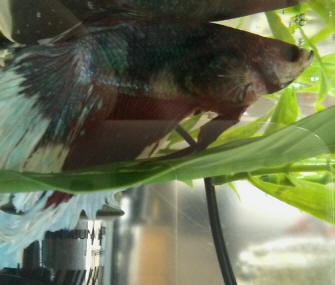
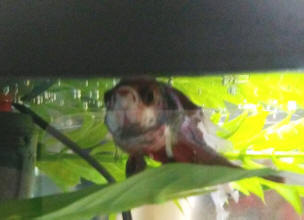
|
Betta likely with virally mediated tumor that developed about four
months ago. 4/25/17
<Possibly a tumour, in which no real treatment, but...>
Did ok in healthy 10 gallon by himself. Heater, filtered, stable water
parameter. Though after about a month with tumor on left side, his "belly" began
bloating as well. Also did ok, even with bloat for about a month.
But now he is getting much more bloated, losing some color, having more
difficulty maneuvering to feed, and even "missing" food as he tries to strike at
surface, as if he's having some vision problems too.
<I'd be trying the old Epsom salt treatment first, ideally alongside an
antibiotic, in case this is some combination of constipation and Dropsy. These
are quite common among Bettas.>
Last ditch effort it was recommended that the belly swelling could be separate
issue caused by too much feeding, now that he's less active these days. Tried
reducing food to three Hikari pellets a day for two days.
<See, the thing is that even offering fewer pellets won't fix constipation,
because it's the dried, processed food that causes the problem. Much better to
use Epsom salt (a mild laxative for fish) alongside something like cooked peas
(if he'll take them) or if that fails live/frozen Daphnia or brine shrimp (more
readily taken, but less effective than plant food). Do see WWM re: the use of
Epsom salt and laxatives, here:
http://www.wetwebmedia.com/fwsubwebindex/gldfshmalnut.htm
Although this applies to Goldfish, the basic idea holds for any/all aquarium
fish. As with humans, there's a strong correlation between inactivity and
constipation. Fish that cannot swim much, whether because of lack of space, lack
of greens, or some type of inbreeding are especially prone to this problem.>
Then fasted for a day. Then three more days with only two or three pellets..
Someone recommended/ commented that he should be fasted " much" longer.?
Please.. How much longer? And could fasting really have any chance of clearing
his belly bloating.?
<See above. Fish can go without food for weeks, so starving is not a major
problem. Cheers, Neale.>
|
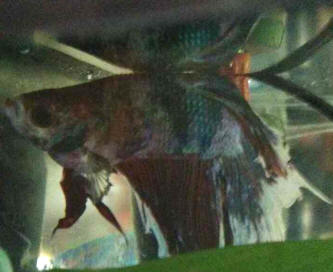
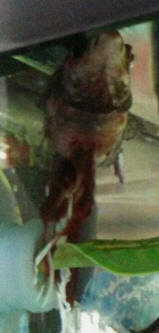 |
|
Update on Betta with swollen belly. fin rot?
5/7/17
*Inserted your latest reply at the beginning here so you might easily
recognize and find the previous associated correspondence. Betta likely
with virally mediated tumor that developed about four months ago.
4/25/17*
<Thank you; edited out in this reply for clarity.>
So I tried the Epsom salt recommendation. 3 tsp's in his ten gallon for
a week. Thank you. Also making sure pellets are thoroughly soaked before
feeding and alternating between pellets and I thaw him a new food,
"Emerald Entree" frozen food to help with his digestive issues. His
tummy swelling is gone! :)
<Well, that's a plus.>
He still has the tumor/cyst on his side, but at least the additional
bloating in his gut is resolved.
<Good.>
Pretty much cleared the Epsom salt from his tank with several 50% water
changes over this past week.
<Understood, but it isn't toxic/stressful for fish, so feel free to use
at the stated concentration for as long as necessary.>
But "now" he's got some fin rot!
<Not uncommon after some types of infection.>
Soooo frustrating. Swelling is down and much color was returning after
Epsom salt and diet changes, as he was quite bloated, faded, and blotchy
looking before treatment.. But now fin rot..? Two steps forward and one
step back.
<That's still progress.>
He has lost a small amount of fin tissue.. mostly at caudal fin. maybe
20%, and anal finnage is red/pink tipped at the ends of about 8 of the
rays.
<All can grow back quickly.>
It is not streaked from his body.
<Which is a good sign.>
Anal fin is pure white with red/pink dots at the very tips of the rays.
Immediately checked all parameters with API master kit.. 0 ammo.. 0
nitrites. 10 ppm nitrates. temp 80 F. All these are the same as usual.
LFS recommended another course of Kanaplex? I protested that he recently
"had"
two courses of that antibiotic to address the tumor/cyst a couple months
ago without any positive results. "shouldn't I try something else?" I
asked. IDK what best to do.
<Antibiotics in themselves aren't dangerous to your fish, or if used
correctly, your filter bacteria. But at the same time, it should be
understood that each aquarium antibiotic contains a different drug.
Kanaplex is Kanamycin, Maracyn 1 is erythromycin, Maracyn 2 is
Minocycline, Furan 2 is Nitrofurazone, Ampicillex is Ampicillin and so
on. Each antibiotic drug treats a slightly different set of bacteria;
this is just
as it is the case with humans, where penicillin might work in some
situations, but your doctor might use erythromycin in another. So, if
one antibiotic you buy from the pet store didn't work as well as hoped,
you
could try another. A lot of aquarists use the combination of Maracyn 1
and Maracyn 2 together, for example, as the two drugs involved cover a
wider range than any single one of them. Alternatively, use a
non-antibiotic
medication like eSHa 2000 with a good track record (as opposed to the
decidedly hit-and-miss teat-tree oil and other new-age products out
there).>
So I added 10 tsp's API aquarium salt to his ten gallon after his weekly
tank vacuum and 50% water change this afternoon. Please.. Any ideas on
what I might do for this new fin rot problem?
<Salt in itself won't help with Finrot, and can stress freshwater fish
if overused, so do be careful here. Cheers, Neale.>
Re: update on Betta with swollen belly. fin rot?
5/8/17
Thank you so much. I'll probably try the Maracyn 1+2 combo..
<'Tis popular. One handles gram-positive, one gram-negative bacteria --
so together should handle a very wide range of pathogens. Cheers,
Neale.>
|
|
Black tiny spots on my Female/Crowntail Betta
3/1/17
I notice three very tiny black spots on my Female/Crowntail Betta's back
area(close to her head), and some black spots on her fins (left side).
These spot start appearing when I thought my fish tank had cycled. It
took a while but, now the tank is cycled. Ammonia 0, pH 7, Nitrites 0,
and Nitrates 0. I have a great filter and heater (depending on the temp
in the room it can be 78-80 degrees. The spots do not seem to hurt or
bother her.
I check to see if they were holes but, they are not. Could going
through the cycling cause these spots?
<Might well be a factor here... Can't be very sure w/o looking at
myself, perhaps sampling, observing w/ a microscope; but "dark marks"
in/on Bettas (and other fishes) are often evidence of stress,
neurological damage... and just genetic (Melanocyte) expression>
The ammonia has high for a week and then 0.
<Ahh; another stressor; often deadly>
Then the nitrites became high for a couple of days and then 0. The
Nitrates were 5.0 ppm and then 0. I used good bacteria to hurry the
cycling process. I have a 2.5 gallon tank.
<Needs to NOT be present in a cycling system; NEEDS a stable, heated,
filtered world>
When I purchase my Betta, she was very small not even a half inch long.
I thought a larger tank would be to much
for her being so young. I do plan to purchase a 5 gallon tank when she
get about 2 inches long.
I would be very thankful for your help. I look forward to hearing from
you.
<I would provide the mentioned needs and NOT treat/medicate here; as
this will only add further stress>
Thank you for taking the time to read my email.
Carolyn Bagley
<Thank you for writing so clearly, completely. Bob Fenner>
Betta with velvet.... /RMF 2/12/17
Hello,
My Betta has had velvet for about 6 weeks.
<Mmm; doubtful; would have been, be dead>
When I first discovered it he was acting lethargic, had clamped fins,
and was breathing heavily. I turned off the lights and with a flashlight
was able to see that he was covered in a fine golden dust.
<Well; these are all symptoms... though, "could be just environment">
After doing research I came to the conclusion that he had many of the
symptoms of velvet. He is normally in a 5 gallon heated and filtered
tank with live plants and one Nerite snail.
<Normally?>
For 6 weeks I have been treating him for the velvet in a 1 gallon
quarantine tank with a heater. I have the temperature up to 85 degrees
and have a towel wrapped around the tank to minimize light.
<Ahh; good treatment strategy>
For the first week I treated him with Betta Revive. He showed some
improvement but was still covered in velvet so I discontinued treatment
with the Betta Revive. For almost a month I have been treating him with
Kordon Rid-Ich Plus and aquarium salt. He is no longer lethargic, his
fins aren't clamped, and he is breathing and eating normally. Everything
about
his behavior is normal, but I can see that he is still covered in the
golden dust (although it is about half as much as when I started
treating him). I am wondering if it is normal for it to take this long
to get rid of velvet?
<It is not... Am going to ask friend and fellow WWM Crew member Neale
Monks for his input here>
And is it advisable to continue medicating him with the Rid-Ich Plus?
The improvement seems to have plateaued at this point. Any help or
suggestions that you can provide are greatly appreciated.
Thanks!
Katelyn
<I would discontinue this treatment... too toxic; and if you're still
concerned (best to confirm Piscinoodinium via sampling and looking
through a microscope) switch to Copper Safe or other chelated copper
treatment for a week. Otherwise, I'd lower the temperature a degree or
so per day and return this fish to the five gallon; and hope it cures
from here. Bob
Fenner>
Betta with velvet.... /Neale 2/13/17
Hello,
My Betta has had velvet for about 6 weeks. When I first discovered it he
was acting lethargic, had clamped fins, and was breathing heavily. I
turned off the lights and with a flashlight was able to see that he was
covered in a fine golden dust. After doing research I came to the
conclusion that he had many of the symptoms of velvet. He is normally in
a 5 gallon heated and filtered tank with live plants and one Nerite
snail. For 6 weeks I have been treating him for the velvet in a 1 gallon
quarantine tank with a heater. I have the temperature up to 85 degrees
and have a towel wrapped
around the tank to minimize light. For the first week I treated him with
Betta Revive. He showed some improvement but was still covered in velvet
so I discontinued treatment with the Betta Revive. For almost a month I
have been treating him with Kordon Rid-Ich Plus and aquarium salt. He is
no longer lethargic, his fins aren't clamped, and he is breathing and
eating normally. Everything about his behavior is normal, but I can see
that he is still covered in the golden dust (although it is about half
as much as when I started treating him). I am wondering if it is normal
for it to take this long to get rid of velvet? And is it advisable to
continue medicating him with the Rid-Ich Plus? The improvement seems to
have plateaued at this point. Any help or suggestions that you can
provide are greatly
appreciated.
Thanks!
Katelyn
<Going to follow up on Bob's ideas here. For sure golden dust sounds a
lot like Velvet. But I will render this opinion: not all strains of
Velvet (or Whitespot) are equally deadly or difficult to treat. There
seems to be a lot of variation. On top of that, fish surely have some
type of immune response to this/these parasites; indeed, I'd not be at
all surprised to
learn that very low levels can persist among basically healthy fish for
months or years, and it's only stress factors (like poor diet or skipped
water changes) that allow these parasites to gain the upper hand and
become noticeable and dangerous. In any event, my medication of
choice for both Whitespot and Velvet is eSHa EXIT, an inexpensive
medication that seems to be highly tolerated by even quite sensitive
fish species, including puffers. For this reason, I prefer it to
standard copper-based medications, though as Bob mentioned, used
correctly copper can be extremely effective.
In a very small aquarium, it is wise to remove carbon (as always, when
medicating) but also remove anything calcareous (such as seashells or
corals) that might absorb copper ions and release them months from now.
Also note that invertebrates, such as snails and shrimps, are likely to
be killed by copper- and formalin-based medications, so remove them
while treating. I would normally medicate the sick fish in its display
tank because Velvet and Whitespot have free-living stages that can
persist for several days in the water, gravel and filter (depending on
water temperature). That said, if you leave the display tank fallow,
i.e., without fish (you can leave snails and shrimps there) for at least
a week at tropical temperatures, two weeks at room temperature, the life
cycle of the parasite will be exhausted. Medicate the Betta in a
hospital tank while this is going on, of course. Hope this helps,
Neale.>
|
Re my Betta girls. (RMF, other ideas?)
2/1/17
<<I'd bleach/nuke all and start over... These situations are untenable... not
easily "solved" to my satisfaction. B>>
Hi a friend recommended I write to u to ask for a diagnosis for what's ailing my
girls lost one yesterday morning and these two this morning.
<Sure; fire away!>
The night before the first death no obvious sign of illness next morning found
the first one barley breathing looking like the two in the picture.
<Yikes! This sort of damage looks like a very dramatic bacterial
infection or something equally systemic, in the sense it isn't a single
wound or parasite, but something more like septicaemia that has affected the
entire fish. Various reasons for these types of problems, but they rarely come
out of nowhere. There's usually some type of stress, coupled with a gradual
running down of the fish over days or weeks. But they can be caused by highly
contagious viral or bacterial infections, though again, rarely does it go from a
healthy fish to a dead fish in the space of 24 hours. Not
impossible, but highly unusual.>
Water parameters
Ammonia 0-0.25
Nitrite 0-0.25
<These two readings are a worry. Ammonia and nitrite need to be zero.
Not almost zero, but zero. Both these chemicals are highly toxic, and even "low"
levels, across days or weeks, can kill a fish. What non-zero levels tend to show
is that filtration isn't adequate to the "loading" of fish in the tank. Filter
too small, flow rate too low, not enough filter medium, or not enough time for
the filter media to become colonised with bacteria. A combination of these
factors is not impossible. Bear in mind that if you aggressively wash filter
media (e.g., by running under a hot tap) this will re-set the biological filter
with every tank clean, resulting in New Tank Syndrome.>
Nitrate 10
Tank brand new running @ 4 weeks with filter and media from their previous tank.
<Assuming you carried across enough live media to jump-start the new filter,
i.e., more or less half-filled the filter with mature medium, the tank shouldn't
be cycling. But still, reflect on this, because something doesn't seem right
with your water quality parameters.>
7 females from one supplier by post added on the 25th Jan.
<While something like septicaemia or Mycobacteriosis isn't impossible,
my gut feeling is that water quality has somehow exacerbated the problem.
Do also consider water temperature: must be around 25 C/77 F all day long, and
exposure to lower temperatures is one very good way to weaken the immune system
of Betta species and drive them to a premature death. Exposure to airborne
pollutants, or even cold air, is another stress factor, though with those I
wouldn't expect to see the sorts of symptoms you've got here.>
Thank you for any help.
<Hope this helps. Cheers, Neale.>
|

 |
|
Re Betta deaths 2/1/17
Thank you for your reply. The previous tank was only 68l the new tank 160l
I've been doing 30l water changes every other day using stability and prime.
Unfortunately the filter in the tank had to be changed ( not the one with the
seeded media in ) but the filter that came with the tank as it trapped and
killed 2 fish.
Tank temp is at 28 it has an AquaEL 2 and a brand new Oase filter in there I
know the water isn't ideal re previous response but the ammonia and nitrite
readings are nearer 0 than 0.25.
I'm treating the tank with Methylene blue as instructed by my supplier.
Whatever this is it's very fast acting they are active and feeding then the red
patches slowly appear and then they die I want to try and save them.
It's frustrating not knowing. Anyway thank you for your help appreciate it.
<Methylene Blue isn't what you want. It's an antifungal medication. Your fish
are definitely dealing with a bacterial infection (fungal infections commonly
have white threads associated with them, so sick fish look furry or fluffy). In
the US, you have a choice of antibiotics available, such as Kanaplex. Outside of
the US, antibiotics are normally prescription-only from a vet, in which case
alternatives may work; here in the UK, I recommend a product called eSHa 2000
for bacterial infections. As a rule, general purpose medications are rubbish, so
avoid them; instead focus on medications specifically for internal bacterial
infections. Cheers, Neale.>
Re my Betta girls (RMF, other ideas?)
2/2/17
Thank you very much for your advice.
<Welcome.>
The remaining girls are in the tank in Methylene blue since yesterday tested
water earlier ammonia negligible nitrite 0 nitrate 5-10 previous results from 3
days ago no further fatalities and they seem much more active
antibiotics arrive tomorrow Oxytetracycline ( sry don't know how to
spell it )
<Close enough!>
in case needed. No more symptoms it's been a very odd situation I know I'm
probably not out of the woods yet will monitor tank for at least 4 weeks before
considering adding any more fish and if further fatalities will gut the
tank and start from scratch.
<Wise.>
This whole thing has me stumped I must admit I'm not a novice I have 7 Betta
boys and the new tank was an upgrade for the girls. Anyway enough rambling thank
you for all ur help appreciate it.
<Glad to have been helpful and good luck! Neale.>
Re my Betta 2/23/17
I emailed you a few weeks ago about the issues with my Betta I lost
three to septicaemia. Then all was fine until whatever the issue is
reoccurred my giant girl became lethargic I isolated and treated with
antibiotics ( Oxytetracycline) sent by my supplier. I lost one girl. I
was advised to put remaining girls in another tank and give them a
course of Oxytetracycline change the substrate in my tank I did this
along with dipping plants in potassium permanganate soaking ornaments
and I also cleaned the tank with pp left for 24 hrs refilled once the
girls treatment was completed ( no
further symptoms) they were returned to the tank. Yesterday I noticed my
giant was lethargic had a red patch again so removed to qt then
overnight I lost 4 girls and the giant. I have 2 survivors no symptoms
as yet ( the girls lost were all from supplier). He's told me to remove
the remaining two girls and qt them.
The tank has some Cory and Oto in that have been fine throughout.
<The Otocinclus may be "riding" your Bettas, causing stress; perhaps
sores leading to bacterial infection>
He's told me to run the tank for two weeks Betta free ( it does have a
UV filter running too ) does this sound the right advise.
<Worth trying>
The symptoms have been fine one minute then red patches on body then
death each time roughly two weeks apart.
Tank parameters
Ammonia 0
Nitrite 0
Nitrates 10
Ph 7.4
<Will share w/ Neale Monks; who has been communicating with you I
believe.
Bob Fenner>
Re my Betta 2/24/17
<<Concur with BobF; and more generally, not a fan of mixing domesticated
Betta splendens in with standard community fish anyway. It does sound
like a systemic bacterial infection, and an antibiotic is really the
only way
forward. Will also opine (and BobF may have another view) that
domesticated Betta splendens are *not* long-lived animals in general;
some six months or more in age before they arrive at the retailers, and
unlikely to live more
than a year thereafter, so if they've been at your pet store for two or
three months, could well be past middle age. Is this is a factor of
genetics? Of over-use of antibiotic on Betta farms? I don't know; but
certainly my experience is that relatively few reach "venerable" status
of 3, 4 years of age. If any consolation, will Betta splendens are said
to be
pretty much annuals. Cheers, Neale.>>
Re my Betta 2/25/17
Thank you for your response my Betta aren't / weren't shop bought but
are from a reputable uk site that breeds Betta in Indonesia and are only
3-4 months old when bought by us/me. I don't know if this makes any
difference to your reply.
<If you're quite sure these Bettas are less than a year old, then yes,
"old age" isn't likely a factor.>
I'm on advice going to run the tank Betta free just with Otto and Corys
for 3 weeks my two survivors are in qt and are showing no symptoms. I do
have a uv steriliser now running do you agree with the timeframe before
adding new Betta girls.
<I would wait at least a month between the demise of one fish and the
addition of another, regardless of the species involved.>
Thank you.
<Welcome. Neale.>
|
 |
Betta Success
Doing what it takes to keep Bettas healthy long-term
by Robert (Bob) Fenner
|
|
|

